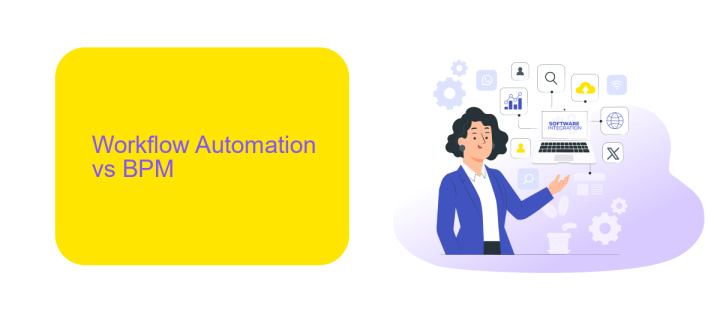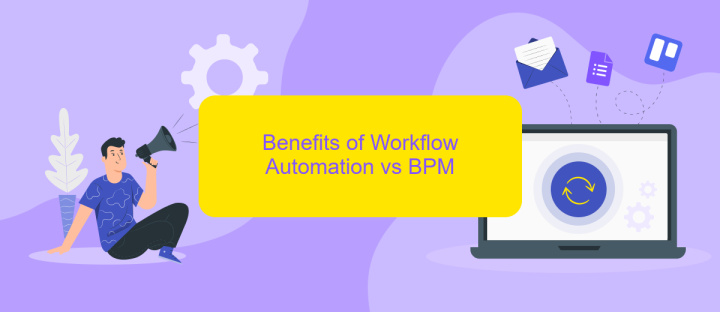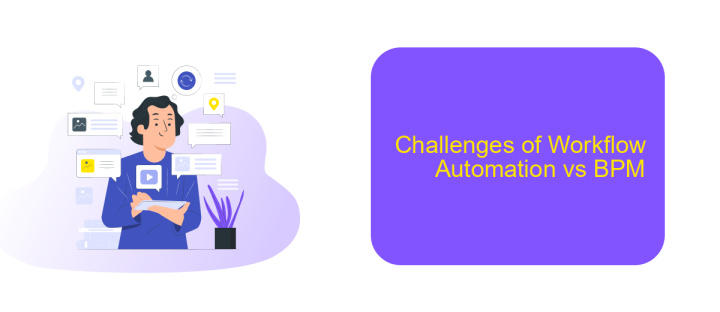Workflow Automation vs BPM
In the modern business landscape, efficiency and optimization are critical for success. Workflow automation and Business Process Management (BPM) are two powerful methodologies that organizations utilize to streamline operations. While both aim to enhance productivity, they differ in scope and application. This article explores the key distinctions between workflow automation and BPM, helping businesses determine which approach best suits their needs.
Introduction
In today's fast-paced business environment, organizations are constantly seeking ways to optimize their processes and improve efficiency. Two popular approaches to achieving these goals are Workflow Automation and Business Process Management (BPM). While both methodologies aim to streamline operations, they differ in scope and application, making it essential to understand their unique benefits.
- Workflow Automation: Focuses on automating specific tasks within a process.
- BPM: Encompasses the management of entire end-to-end business processes.
- Integration Tools: Services like ApiX-Drive facilitate seamless integration between different systems.
Choosing between Workflow Automation and BPM depends on your organization's specific needs and goals. Workflow Automation is ideal for automating repetitive tasks, while BPM provides a comprehensive framework for managing complex processes. Integration tools such as ApiX-Drive can further enhance these methodologies by enabling smooth data flow between various applications, ensuring a cohesive and efficient operational environment.
Workflow Automation vs BPM

Workflow Automation and Business Process Management (BPM) are often conflated, yet they serve distinct roles within an organization. Workflow Automation focuses on automating repetitive tasks to enhance efficiency and reduce human error. It allows teams to streamline processes and ensure that tasks are completed consistently and accurately. Tools like ApiX-Drive can be instrumental in this regard, offering seamless integration between various applications and automating data transfers, thereby saving time and resources.
On the other hand, BPM is a comprehensive approach to improving organizational processes. It involves analyzing, modeling, and optimizing business processes to achieve strategic goals. While Workflow Automation can be a component of BPM, BPM encompasses a broader scope, including process design, monitoring, and continuous improvement. It aims to align processes with business objectives, ensuring that the entire workflow is efficient and effective. In essence, Workflow Automation handles the "how" of task execution, whereas BPM addresses the "what" and "why" of business processes.
Benefits of Workflow Automation vs BPM

Workflow automation and Business Process Management (BPM) are both essential for optimizing business operations, but they offer distinct benefits. Workflow automation focuses on automating repetitive tasks to enhance efficiency and reduce human error. On the other hand, BPM provides a comprehensive approach to managing and improving business processes through analysis, modeling, and optimization.
- Increased Efficiency: Workflow automation streamlines tasks, reducing the time and effort required, while BPM ensures processes are optimized for better performance.
- Cost Savings: Automation reduces labor costs by minimizing manual intervention, whereas BPM identifies inefficiencies and areas for cost reduction.
- Improved Accuracy: Automation minimizes human error, and BPM ensures processes are consistently executed according to best practices.
- Scalability: Workflow automation can easily scale with business growth, while BPM provides a framework for scaling processes efficiently.
- Enhanced Integration: Tools like ApiX-Drive facilitate seamless integration between various applications, enhancing both workflow automation and BPM effectiveness.
In summary, while workflow automation excels in automating specific tasks for immediate efficiency gains, BPM offers a strategic approach to process management and optimization. Utilizing both can lead to significant improvements in operational performance and cost savings.
Challenges of Workflow Automation vs BPM

Workflow automation and BPM (Business Process Management) offer significant advantages, but they come with their own set of challenges. Understanding these challenges is crucial for businesses aiming to optimize their operations effectively.
One of the primary challenges in workflow automation is the complexity of integrating various systems and applications. Businesses often use multiple software solutions, and ensuring seamless communication between them can be daunting. On the other hand, BPM faces difficulties in aligning business processes with strategic goals, requiring continuous monitoring and adjustments.
- Integration Complexity: Both workflow automation and BPM require robust integration capabilities to connect disparate systems.
- Scalability Issues: Scaling automated workflows or BPM solutions can be challenging as business needs grow.
- User Adoption: Ensuring that employees adapt to new automated workflows or BPM systems can be a significant hurdle.
- Maintenance: Regular updates and maintenance are essential to keep both systems running smoothly.
To address integration complexities, services like ApiX-Drive can be highly beneficial. ApiX-Drive simplifies the process of connecting various applications, allowing businesses to automate workflows without extensive technical expertise. By leveraging such tools, companies can overcome many of the challenges associated with workflow automation and BPM, ensuring smoother operations and better alignment with business objectives.


Conclusion
In conclusion, both Workflow Automation and BPM offer significant advantages for streamlining business processes, but they serve different purposes and cater to different needs. Workflow Automation focuses on automating repetitive tasks and enhancing efficiency at a micro level, making it ideal for small to medium-sized tasks that require quick and efficient execution. On the other hand, BPM provides a broader, more strategic approach, focusing on optimizing and managing end-to-end business processes to achieve long-term organizational goals.
Choosing between Workflow Automation and BPM depends largely on the specific requirements and objectives of your organization. For businesses looking to integrate various applications and services seamlessly, tools like ApiX-Drive can be particularly beneficial. ApiX-Drive facilitates the integration process, allowing for smoother and more efficient workflows, thereby bridging the gap between different systems and enhancing overall productivity. Ultimately, the right choice will depend on your business's unique needs and the level of process complexity you aim to manage.
FAQ
What is the difference between Workflow Automation and BPM?
Can Workflow Automation and BPM be used together?
What are the benefits of Workflow Automation?
How can I implement Workflow Automation in my business?
What industries benefit most from BPM?
Apix-Drive is a simple and efficient system connector that will help you automate routine tasks and optimize business processes. You can save time and money, direct these resources to more important purposes. Test ApiX-Drive and make sure that this tool will relieve your employees and after 5 minutes of settings your business will start working faster.

